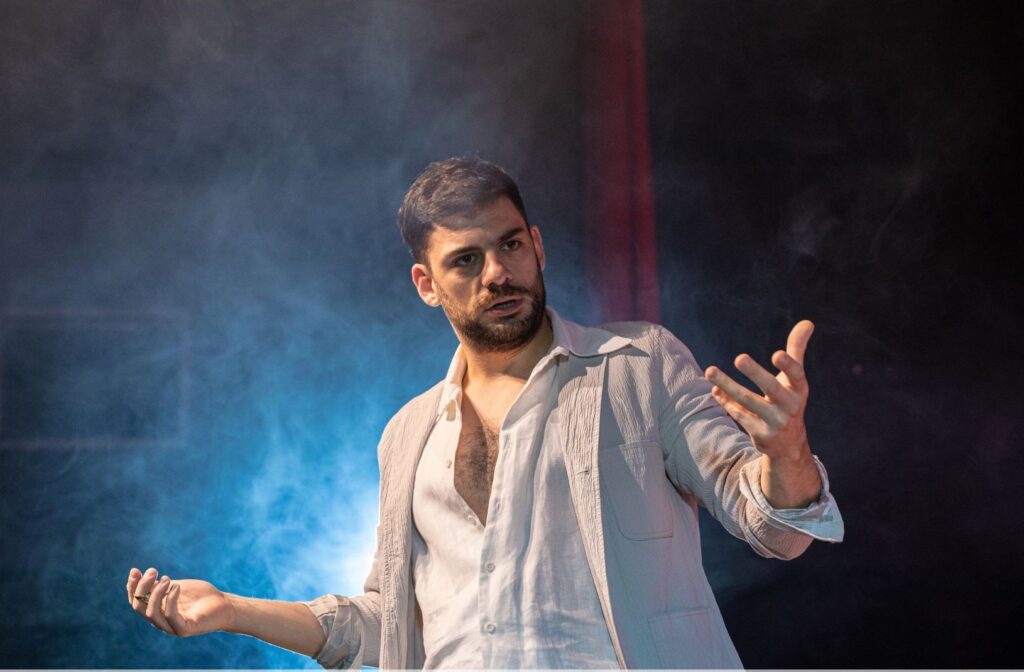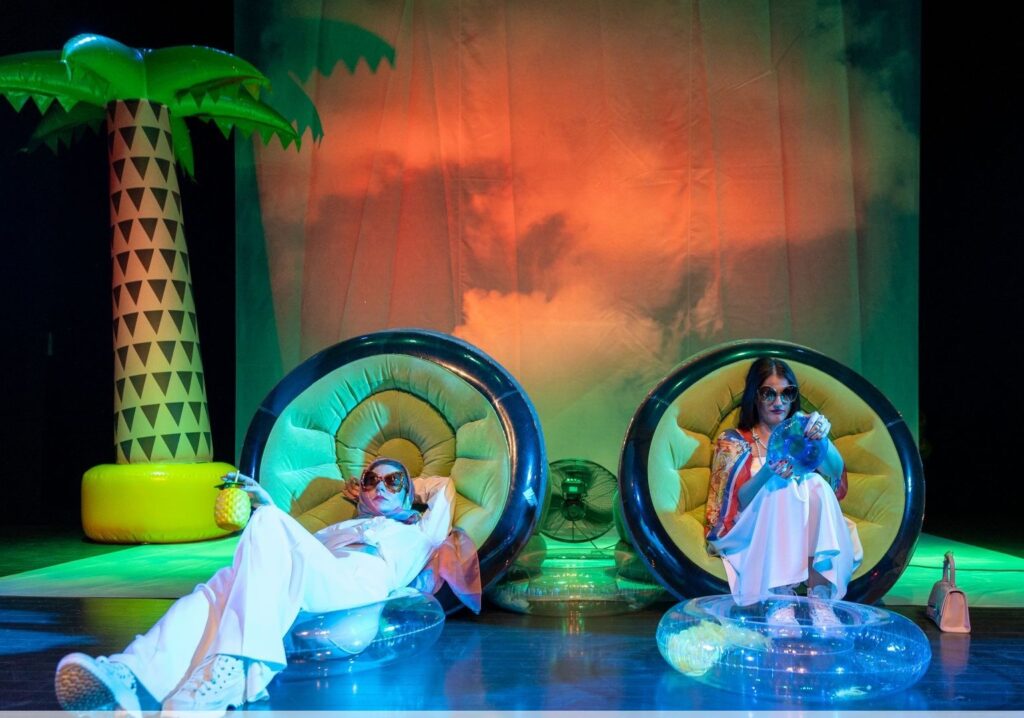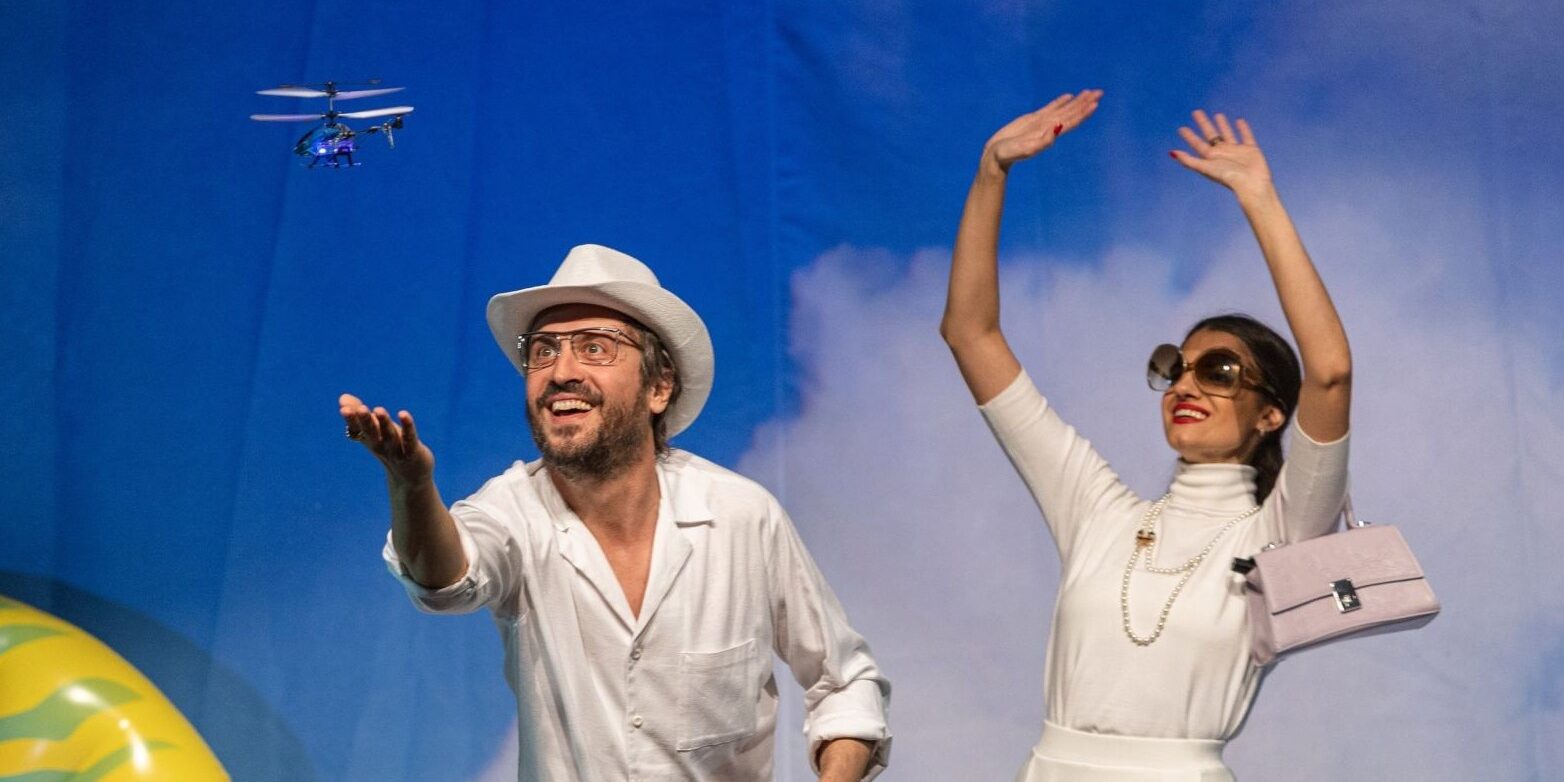BITEF Teatar, Belgrade, premiere 7th April 2023
Richard Burton played many great roles in his day. A renowned Shakespearean, his performance of Hamlet is legendary, and on screen he played both Alexander the Great and King Arthur. In 1973, he would play another famous leader: Marshall Josip Broz Tito.
Sutjeska was one of the most expensive films in Yugoslav cinema history, an epic Partisan war movie made to commemorate a key moment in the Second World War. It was also rare in that it featured Tito as a character.
The making of the film is the inspiration for Kokan Mladenović’s play Once Upon a Time in Brijuni, though it is less a play about the moviemaking process than one about the act of acting or, rather of roleplaying. It’s a play about the performative nature of leadership, that asks where the line lies between the public persona and the person underneath.
Tito had an excellent grasp of image and iconography. His face was as familiar as any film star, his photo given pride of place on people’s walls, and yet he is a man about whom concrete facts remain hazy, like his exact date of birth. Tito is a construction. Even his name is a penname, one he chose for himself. He was also a massive film fan, and well understood their power in myth-building.
Burton forged a career inhabiting other people and yet was known as much for his tempestuous private life with screen icon Elizabeth Taylor, a couple who famously divorced and remarried. Taylor was famous for most of her life, she became a film star as a child and barely knew another way of being, barely knew a time when she wasn’t in the public eye. “I don’t even remember a time when people didn’t know who I was,” she says in the play.
Mladenović trains his lens in on this quartet – Tito, Burton, Taylor, and Tito’s wife Jovanka Broz. Played by Branislav Trifunović, Milan Marić, Tihana Lazović, and Sanja Marković, the actors all wear white outfits – the costume equivalent of a blank canvas – and each one in turn dons an accessory, a ring or a pair of 70s sunglasses, that signals their character. There is no attempt to mimic or inhabit the people they are playing, no attempt to replicate their gestures or voices, to capture, say, Burton’s distinctive Welsh accent – throughout their individual scripts lie at their feet.
The four are all well known stars of Serbian and Croatian stage and screen – with their own recognition factor – and this is how they are presented on stage. There are no wigs or prostheses. They do not lose themselves in the characters. They remain present within their performances.
In his diaries Burton seemed a bit bemused by his Yugoslav experience, by the adulation and ostentatious luxury with which Tito surrounded Tito. (“E deeply thrilled. Me cynical as ever,” he wrote at the time). He also thought the role was underwritten – the screen writers perhaps being apprehensive about humanising the great leader.
Tito wants the film to celebrate the tenacity of the partisans and their victory, to tell the story he wants to tell, a story of heroism and victory against the odds. He wants an actor of Burton’s stature and talent to play him but can’t resist falling in the role of director/commander. The two men clash in a scene where Burton is playing the moment when Tito was wounded. Tito tells him to do it differently, Burton however would rather make his own choices as an actor, to play the part his way (because it is just that, a part). Tito argues that he knows a thing or two about acting – Stanislavski told him so – but Burton counters that there’s a difference to playing someone and becoming them.
Meanwhile Taylor encourages Jovanka to come out of her husband’s shadow and take up more space, to insert herself into the story – she was a lieutenant colonel in the Yugoslav Army after all, she has a compelling narrative too – even if it means bending history a bit. This is something she finds appealing, for a while at least, though eventually she demurs.
This scene aside, it does feel as if Mladenović is slightly less interested in the idea of role-playing in relationship to women, the acting often required for women to navigate the world of men, whether or not you’re a megastar like Taylor.

Milan Marić in Once Upon a Time in Brijuni Photo: Marijana Janković
When Taylor and Burton have one of the furious rows for which they were famous, Tito and Jovanka are alarmed at first but then declare it as a good as a scene from Albee’s Who’s Afraid of Virginia Woolf, in which the couple starred together, entangling the couple’s screen selves with the real-life people.
The colourful scenography (by Marija Kalabić) does not attempt to realistically recreate the time-period or island setting, rather the design consists of various beach inflatables, palm trees, seashells, and those little floating drinks holders that people use in pools. The movie stars’ helicopter arrival on the island is done via a toy, which is piloted into the palm of Tito’s hand. Images of the four in real life are occasionally projected in the background, allowing for a juxtaposition between the actors on stage and the real versions on screen (though the repetition of these images comes to feel unnecessary after a while).
The performance (dramaturgy by Dimitrije Kokanov) is often incredibly funny. The scene when Tito and Jovanka try to explain the context of the battle, who was fighting whom, to an increasingly perplexed Burton is hilarious – at one point, Marković’s bends her body into a bridge to assist Tito in his explanation, making herself into a prop. The reality is too complicated, Burton says at the end, an international audience won’t get it, people need clear-cut villains and heroes. They need a narrative they can follow.
While none of the actors attempt to replicate the people they are playing, they do convey the essence of their characters. Marić – who’s also currently playing a magnetic gangster Oedipus at the Yugoslav Drama Theatre – deploys his easy charisma as Burton. He has an immensely watchable quality. Lazović captures the languid glamour of Taylor, Marković has a quirky, compelling intensity as Jovanka, while a behatted Trifunović plays Tito as a Hollywood director, a man accustomed to being obeyed. (Incidentally, before the show begins, the performers read a statement in response to the ruling party’s recent attacks on actors, and their seeming belief that people who earn a living from performance someone forfeit their voice in the political arena, which accidentally gives the play an extra metatheatrical frisson).

Once Upon a Time in Brijuni. Photo: Marijana Janković
The production, however, runs the risk of becoming an essay on image-building and performance. The point about all four being engaged in role play both on and off screen does come to feel a little heavy-handed after a while (“We’re all actors,” Taylor tells Jovanka, and, yeah, Liz, we get it). But then the performance changes gear. It shifts into a kind of frenzied and orgiastic dance (choreography by Andreja Kulešević) in which all four writhe and jive to a disco-funk version of Bella Ciao, the performance morphing into an extended carnival of glitter and twerking, the sweat stripping the make-up from their faces. Lazović throws herself into this intensely physical sequence so vigorously that she grazes a knee, a spot of crimson appearing on her white trousers, a moment of bodily reality punctuating the layers of artifice.
The play concludes with some reflections on legacy, on the afterlife accorded by fame. Burton and Taylor are still the subject of fascination, continually dramatized – Jack Thorne’s The Motive and the Cue about Burton’s performance of Hamlet recently opened at the National Theatre in London – Tito’s legend persists in other ways. The actors leave the stage but, in many ways, they remain.
Credits:
Author and director: Kokan Mladenović //Dramaturg: Dimitrije Kokanov//Scenography: Marija Kalabić//Costumes: Aleksandra Pecić Mladenović//Choreography: Andreja Kulešević
Cast: Milan Marić, Branislav Trifunović, Tihana Lazović, Sanja Marković
For more information, visit: BITEF.teatar.rs
Further reading: review of Oedipus starring Milan Marić at Yugoslav Drama Theatre
Natasha Tripney is a writer, editor and critic based in London and Belgrade. She is the international editor for The Stage, the newspaper of the UK theatre industry. In 2011, she co-founded Exeunt, an online theatre magazine, which she edited until 2016. She is a contributor to the Guardian, Evening Standard, the BBC, Tortoise and Kosovo 2.0








